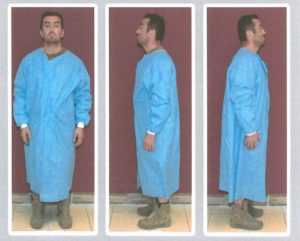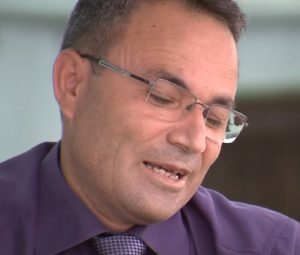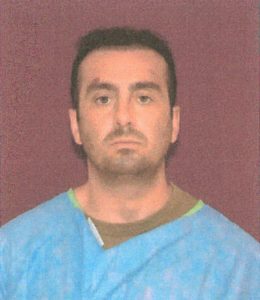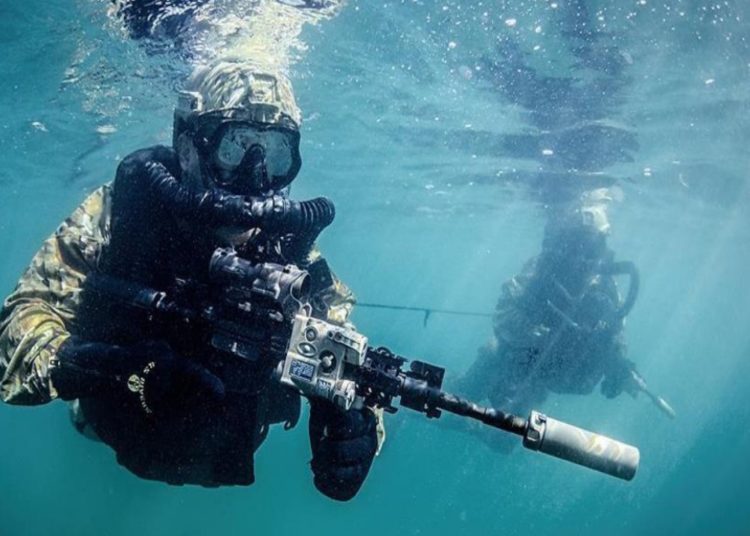Abdullah Bozkurt/Stockholm
A navy lieutenant who had worked in Turkey’s elite special forces was beaten so badly that all the skin on his body turned black due to contusions caused by the trauma, and he had to be hospitalized for the injuries he had sustained.
“I was beaten with batons and bats for hours by people in civilian clothes who I thought were policemen. My nose was broken. My whole body turned black like the school uniform I used to wear when I was a kid. I remember reciting the shahada [declaration of faith for a Muslim who thinks their death is imminent] many times, thinking I was going to die during this endless cycle of beating,” Ferat Erten, a 39-year-old navy lieutenant, told the court on July 18, 2018 during a hearing at the Ankara 4th High Criminal Court.
Erten was working as team commander for the Turkish navy’s Underwater Offense (Su Altı Taarruz, or SAT), the equivalent of the US Marines, when he was detained in 2016 on alleged coup involvement. He said had nothing to do with the coup attempt and was simply standing guard at the entrance of an airbase in Ankara as ordered by his commanders.
He was one of the many who underwent brutal torture in the Turkish capital so that he would sign false statements supporting the government storyline on what many believed was a false flag operation on July 15, 2016 to transform NATO’s second largest army in terms of manpower into a hotbed of xenophobic Islamists, nationalists and neo-nationalists.
The court testimony of Ferat Erten revealed the brutal torture he endured under custody:
The torture and ill-treatment of victims in detention centers and prisons has in recent years been systematically practiced in Turkey with the approval of state authorities. Cases of enforced disappearance have been on the rise, with Turkish intelligence running black sites to keep victims in incommunicado for months.
During his first court hearing in the two years he had been in jail, Erten had the opportunity to tell his heartbreaking story. He started his defense by recanting a statement taken by the police under duress and threat and spoke about the torture he had endured in custody.
“It hurts to even describe the torture I’ve been through, but I’m going to talk about it very briefly because I want it to be entered into the court record,” he told the panel of judges. “On July 16 the Kazan gendarmerie station witnessed the most shameful treatment in human history,” he said. The post is an hour’s drive from Ankara and is located near the airbase.

“There was no water provided during the torture. When I asked for it, water was poured on the ground and I was ordered to lick it from the floor. They were kicking me in the head like they were kicking a football while I was licking the floor. And when I passed out, they hit me all over my body with bats to wake me up,” the navy lieutenant said.
“It went on like this until evening. I think they got tired, and that’s why they finally left me,” he said, recalling how he was eventually taken to a hospital before the authorities sent him to Sincan Prison. At the hospital the doctor was under pressure to not record any injuries in the medical file. He was dressed in a blue surgical gown to cover his bruises and hide the marks of torture. In fact, when he was photographed at the prison for identification, he was still in that gown.
The torture did not end when he was transferred from detention to the prison. The beatings continued in the Sincan No. 2 F-type high security prison, where he was put in solitary confinement. He lost count of how many times he was beaten by prison guards, but he remembered the most vicious guard among them was somebody named Çağatay.
Medical report that confirmed the torture of Ferat Erten by the police:
In one of the rare cases of confirmation of torture under custody, Erten’s medical file verified torture and abuse when he was hospitalized due to the extensive injuries he sustained. In most cases doctors chose not to report and record torture for fear of imprisonment and punishment. What is more, the government of President Recep Tayyip Erdoğan issued an executive decree that granted blanket immunity for officials who were involved in beating and torturing victims. The criminal complaints against torturers were not investigated by prosecutors, who cited the decree as justification for non-prosecution.
A medical report issued on July 17, 2016 by Dr. Zehra Güven Çetin of the Dr. Nafiz Körez Sincan State Hospital said he sustained beatings all over his body and that his nose was broken. Dr. Çetin referred him to specialists at the hospital for further treatment. The second report issued by the hospital on the same day found multiple beating marks on his back, head, arms and face.

He spoke about the torture in his statement to public prosecutor Cihan Ergün and said he wanted to file a complaint against his abuser. But the prosecutor took no action and referred him to court for arrest. At a quick arraignment Judge Köksal Çelik formally arrested him without even bothering to look into the torture allegations and medical reports.
Erten was on a leave of absence and vacationing with his wife in his home village in Turkey’s eastern province of Erzurum when he was ordered to join an emergency mission team by his commanding officer. He was not happy with an abrupt break in his vacation with his new wife, who asked him to not go. But he had to comply with the deployment order, which was not unusual for SAT team members, who were often scrambled at the last minute as a rapid response team to intervene in breaking developments on special assignment.
He flew to Istanbul to join the mission. He and his navy colleagues were transported to the military section of Istanbul Atatürk Airport, from where they were flown on a CASA aircraft to Akıncı Air Base in Ankara. They did not know about the mission or where they were even heading. For Erten and his comrades, nothing seemed out of the ordinary as he had taken part in many missions in Turkey and abroad under exactly the same circumstances.

When they landed, Erten did not know that they were actually on Akıncı Air Base, a military installation that he had never visited before. They were told that Chief of General Staff Gen. Hulusi Akar was at the base and that their mission was to secure the base. Since he had been deployed to Akar’s protective detail many times in the past, Erten did not find his orders to be unusual.
Erten led a group of SAT team members to the gate near the military housing complex where officers and their families live. He was still thinking about how quickly he could get back to Erzurum to resume his vacation once the mission was over.
He and his men were surprised when they found themselves confronted by an unruly crowd that was trying to breach the security perimeter and enter the base. He did not understand what was going on but wanted to ensure that the crowd didn’t enter the secure zone. He asked his men to call the police, who have more experience in crowd control, but the police never came. The crowd was organized by the local municipality run by the Turkish president’s Justice and Development Party (AKP).
The second medical report detailed some of the marks of torture on Ferat Erten:
The crowd kept pushing, prompting troops to fire warning shots in the air. They held their ground and stood guard at the gate until morning, when the base came under bombardment. The situation quickly became chaotic, and his commanding officer, Özay Cödel, told team members that they had been taken to the base on false pretenses and that SAT Group Commander Col. Mustafa Turan Ecevit was not picking up his phone.
Ecevit never stood trial and was not charged by prosecutors, reinforcing the view that the coup attempt was a false flag operation planned by President Erdoğan and his military and intelligence chiefs in order to launch a mass purge of the army and staff the vacated positions with Islamists and neo-nationalists.
However, the SAT team members who followed the orders given by their superiors were subjected to terrible torture and ill-treatment, charged under dubious evidence and eventually convicted in sham trials. In November 2020 partisan judges ruled for nine aggravated life sentences for Erten plus 1,548 years in prison.












